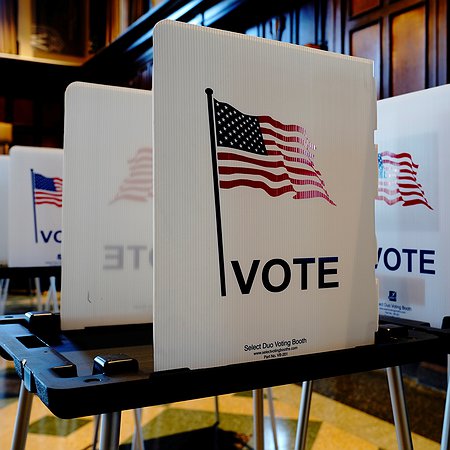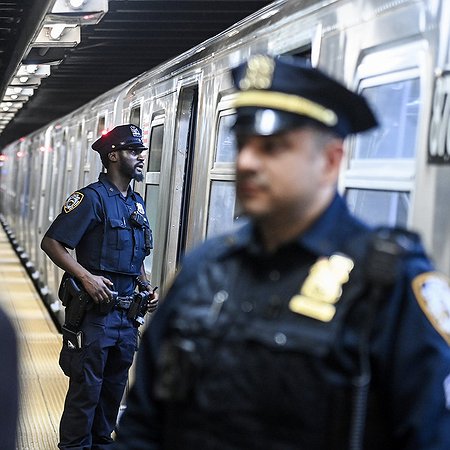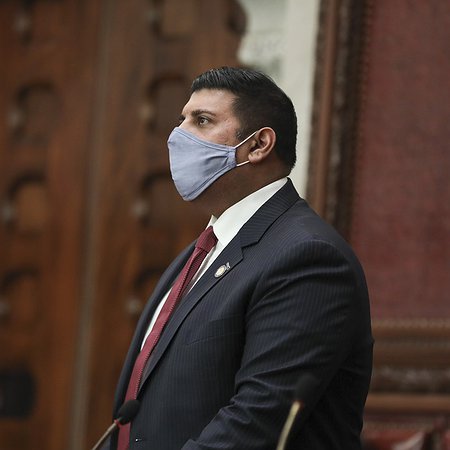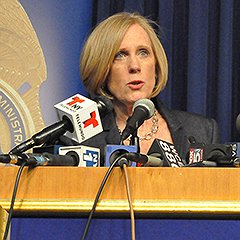No Testimony to Support Hochul's Claims at Legislative Hearing
New York lawmakers heard no testimony to support Governor Kathy Hochul’s unsubstantiated claims that judges are confused and inconsistencies exist within the state’s bail laws.
The Briefing

New York lawmakers heard no testimony to support Governor Kathy Hochul’s unsubstantiated claims that judges are confused and inconsistencies exist within the state’s bail laws at an all-day budget hearing on public protection this week.
Instead, the testimony often focused on the dangerous implications of Hochul’s proposal to remove the least restrictive means standard in bail-eligible cases. State officials and advocacy organizations testified that judges are not confused about the law and that Hochul’s proposal is expensive, dangerous and regressive.
Testimony did not support the reasoning behind Hochul’s proposal
In the rollout for her budget proposal, Hochul stated judges “don’t have the clarity they need” to make informed decisions in bail-eligible cases. But the chief judge from the Office of Court Administration told lawmakers that judges do not need additional training to understand the state’s bail reform laws.
"I don't think the majority of judges who make these decisions don't understand what their options are," said Tamiko Amaker, the acting Chief Administrative Judge. "They're just looking at the specific circumstances that are before them.”
Amaker’s assertion contravenes the idea that judges are confused about the law, a major portion of Hochul’s reasoning for eliminating the least restrictive means standard.
There is no reason for judges to be confused about a clear and consistent legal standard that has existed for decades. Judges in New York have been constitutionally required for decades to consider the least restrictive means necessary to ensure someone appears for future court dates. The bail reform law did not change how judges made decisions; it simply added language to the law that had been the constitutionally required practice for almost half of a century. Both before and after 2020, in bail-eligible cases, judges weigh a number of factors to decide whether someone is going to return to court, using the principle of least restrictive means to ensure compliance.
Hochul’s proposal is regressive
Attorneys and advocates testified that Hochul’s proposal does away with a standard that has existed for decades in New York and flies in the face of the reasoning behind the state’s modest bail reform laws.
“The Governor’s proposed language would not only gut the recent bail reforms but move the law further back,” wrote the New York State Defenders Association, adding that there is no data to support rollbacks to New York’s bail laws.
Hochul’s proposal takes away all standards for when a judge can or should set bail. If passed, Hochul’s proposal would allow a judge to set bail whenever and for whatever reason the judge wanted to. The outcome of the change will be complete arbitrariness.
The Center for Community Alternatives, a leader in alternatives to incarceration, noted that 33 other states have a least restrictive means standard, as New York currently does. But no states have no standard at all, as Hochul is proposing.
Jails do not make us safer
As Hochul and lawmakers negotiate the state’s budget, the stakes are high. Hochul’s proposal would increase pretrial jailing, disproportionately affecting Black and Latinx New Yorkers, who make up nearly 75 percent of the pretrial jail population in the state.
Advocates underscored the grave implications of removing the least restrictive means standard at Tuesday’s hearing.
“It is unconscionable that after a year in which 19 people passed away on Rikers – the most deaths on the island in the last decade and the worst death rate in 25 years – the Governor would put forth a proposal that will send more New Yorkers to be jailed there,” wrote the Katal Center, which works to end mass criminalization and incarceration.
The Katal Center noted that taxpayers pay $500,000 per year for each person held at Rikers.
Tyrell Muhammed of #HALTSolitary stated that jail populations increased after the last two bail rollbacks. “There is a crisis of abuse and death in local jails, which will only be exacerbated by any further attempts to continue increasing pre-trial caging,” he wrote.
On Saturday, Marvin Pines died at Rikers while held on a $50,000 bond, the first death at Rikers in 2023 amid horrific conditions, missed medical appointments and ongoing violence.
Invest in communities, not cages
Hochul and lawmakers know that bail reform has nothing to do with crime. Advocates called on Hochul to focus on policies that actually keep New Yorkers safe.
“If politics followed the data, we wouldn’t be here, because the data is clear: bail reform works, and we should do more of it,” wrote the Katal Center. “If politics followed the data, the governor’s public safety proposals would be massive investments in housing, health care, education, jobs.”
Story Link
Coverage of the hearing in the Albany Times-Union








